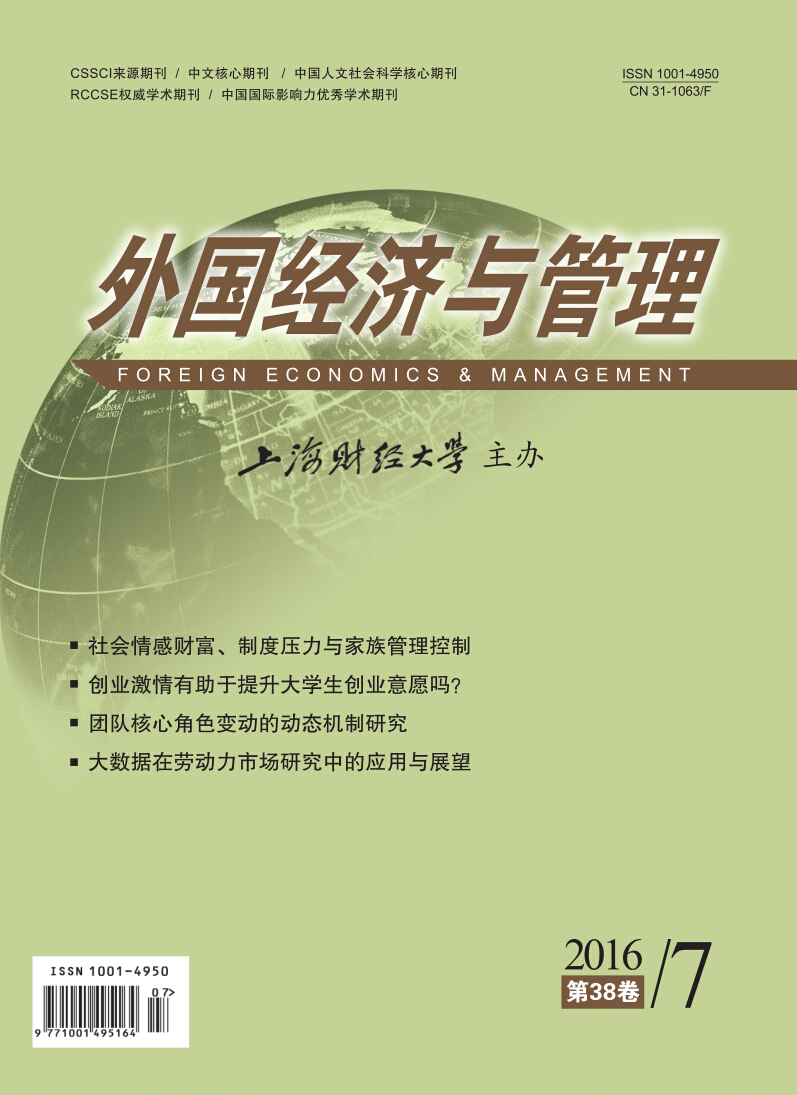本文根据中国家族企业的代际传承现状以及家族二代被冠以“富二代”的社会认知偏向等现实背景,基于社会认同理论,以2004—2013年间中国沪深A股二代涉入的308上市家族企业的数据为研究样本,研究家族企业二代成员通过多元化战略实现创业成长的决策形成机制及其影响因素。研究发现:在非制造业家族企业中,二代自主权对企业多元化战略的实施具有显著的促进作用,而二代教育水平一定程度上弱化了二代自主权和企业多元化战略之间的正相关关系;在制造业家族企业中,二代自主权和企业多元化战略之间具有负相关关系,其中二代的海外经历对此具有负向调节作用。这表明家族二代成员为获得社会认同而通过企业内部实施战略变革时,受企业所处的行业因素和其自身的能力禀赋的影响。研究结论不仅拓展了家族传承背景下的多元化战略的理论范畴,对于家族传承的战略实践也具有参考意义。
二代自主权与家族企业多元化战略:能力禀赋的调节效应
摘要
参考文献
1 陈凌, 陈华丽. 家族涉入、社会情感财富与企业慈善捐赠行为——基于全国私营企业调查的实证研究[J]. 管理世界, 2014, (8):90-101.
2 郭超. 子承父业还是开拓新机——二代接班者价值观偏离与家族企业转型创业[J]. 中山大学学报(社会科学版), 2013, (2):189-198.
3 贺小刚, 连燕玲. 家族权威与企业价值:基于家族上市公司的实证研究[J]. 经济研究, 2009, (4):90-102.
4 贾良定, 张君君, 钱海燕, 等. 企业多元化的动机、时机和产业选择——西方理论和中国企业认识的异同研究[J]. 管理世界, 2005, (8):94-104.
5 李培功, 沈艺峰. 媒体的公司治理作用:中国的经验证据[J]. 经济研究, 2010, (4):14-27.
6 李新春. 经理人市场失灵与家族企业治理[J]. 管理世界, 2003, (4):87-95.
7 李新春, 何轩, 陈文婷. 战略创业与家族企业创业精神的传承——基于百年老字号李锦记的案例研究[J]. 管理世界, 2008, (10):127-140.
8 李有根, 赵锡斌. 国外经理自主权研究及测量[J]. 外国经济与管理, 2003, (12):2-6.
9 梁强, 刘嘉琦, 周莉, 等. 家族二代涉入如何提升企业价值——基于中国上市家族企业的经验研究[J]. 南方经济, 2013, (12):51-62, 92.
10 鲁倩, 贾良定. 多元化测量方法的内涵和理论视角:对内容效度的考查[J]. 南大商学评论, 2007, (4):103-115.
11 王沛, 刘峰. 社会认同理论视野下的社会认同威胁[J]. 心理科学进展, 2007, (5):822-827.
12 杨鑫, 金占明, 李鲲鹏. 多种行业因素与多元化战略的关系研究——基于中国上市公司的实证研究[J]. 南开管理评论, 2010, (6):41-49.
13 杨学儒, 李新春. 家族涉入指数的构建与测量研究[J]. 中国工业经济, 2009, (5):97-107.
14 张莹瑞, 佐斌. 社会认同理论及其发展[J]. 心理科学进展, 2006, (3):475-480.
15 Anderson R C, Reeb D M. Founding-family ownership and firm performance:Evidence from the S&P 500[J]. The Journal of Finance, 2003, 58(3):1301-1328.
16 Ashforth B E, Mael F. Social identity theory and the organization[J]. Academy of Management Review, 1989, 14(1):20-39.
17 Au K, Chiang F F T, Birtch T A, et al. Incubating the next generation to venture:The case of a family business in Hong Kong[J]. Asia Pacific Journal of Management, 2013, 30(3):749-767.
18 Beck L, Janssens W, Debruyne M, et al. A study of the relationships between generation, Market orientation, and innovation in family firms[J]. Family Business Review, 2011, 24(3):252-272.
19 Boeker W. Strategic change:The influence of managerial characteristics and organizational growth[J]. Academy of Management Journal, 1997, 40(1):152-170.
20 Brown R. Social identity theory:Past achievements, current problems and future challenges[J]. European Journal of Social Psychology, 2000, 30(6):745-778.
21 Burgelman R A, Hitt M A. Entrepreneurial actions, innovation, and appropriability[J]. Strategic Entrepreneurship Journal, 2007, 1(3-4):349-352.
22 Chung H M. The role of family management and family ownership in diversification:The case of family business groups[J]. Asia Pacific Journal of Management, 2013, 30(3):871-891.
23 Eddleston K A, Kellermanns F W. Destructive and productive family relationships:A stewardship theory perspective[J]. Journal of Business Venturing, 2007, 22(4):545-565.
24 Ellemers N, Spears R, Doosje B. Self and social identity[J]. Annual Review of Psychology, 2002, 53(1):161-186.
25 Faccio M, Lang L H P, Young L. Dividends and expropriation[J]. American Economic Review, 2001, 91(1):54-78.
26 Gómez-Mejía L R, Makri M, Kintana M L. Diversification decisions in family-controlled firms[J]. Journal of Management Studies, 2010, 47(2):223-252.
27 Gort M. Front matter, Diversification and integration in American industry[A]. Gort M. Diversification and Integration in American Industry[M]. Westport:Greenwood Press, 1962.
28 Graves C, Thomas J. Determinants of the Internationalization Pathways of Family Firms:An Examination of Family Influence[J]. Family Business Review, 2008, 21(2):151-167.
29 Hambrick D C, Finkelstein S. Managerial discretion:A bridge between polar views of organizational outcomes[J]. Research in Organizational Behavior, 1987, 9:369-406.
30 Hambrick D C, Mason P A. Upper echelons:The organization as a reflection of its top managers[J]. Academy of Management Review, 1984, 9(2):193-206.
31 Hoy F, Sharma P. Entrepreneurial family firms[M]. Upper Saddle River, NJ:Pearson Prentice Hall, 2009.
32 Jaffe D T, Lane S H. Sustaining a family dynasty:Key issues facing complex multigenerational business- and investment-owning families[J]. Family Business Review, 2004, 17(1):81-98.
33 Jones C D, Makri M, Gomez-Mejia L R. affiliate directors and perceived risk bearing in publicly traded, family-controlled firms:The case of diversification[J]. Entrepreneurship Theory and Practice, 2008, 32(6):1007-1026.
34 Kellermanns F W, Eddleston K A. Corporate entrepreneurship in family firms:A family perspective[J]. Entrepreneurship Theory and Practice, 2006, 30(6):809-830.
35 Kellermanns F W, Eddleston K A, Barnett T, et al. An exploratory study of family member characteristics and involvement:Effects on entrepreneurial behavior in the family firm[J]. Family Business Review, 2008, 21(1):1-14.
36 Kepner E. The family and the firm:A coevolutionary perspective[J]. Family Business Review, 1991, 4(4):445-461.
37 Kohn M L, Schooler C. Work and personality:An inquiry into the impact of social stratification[M]. Norwood, NJ:Ablex, 1983.
38 Ling Y, Kellermanns F W. The effects of family firm specific sources of TMT Diversity:The moderating role of information exchange frequency[J]. Journal of Management Studies, 2010, 47(2):322-344.
39 Marris R. Managerial capitalism in retrospect[M]. Basingstoke:MacMillan, 1998.
40 Miller D, Chen M J. Sources and consequences of competitive inertia:A study of the U.S. airline industry[J]. Administrative Science Quarterly, 1994, 39(1):1-23.
41 Miller D, Le Breton-Miller I. Managing for the long run:Lessons in competitive advantage from great family businesses[M]. Boston:Harvard Business School Press, 2005.
42 Miller D, Le Breton-Miller I. Governance, social identity, and entrepreneurial orientation in closely held public companies[J]. Entrepreneurship Theory and Practice, 2011, 35(5):1051-1076.
43 Plate M, Schiede C, von Schlippe A. Portfolio entrepreneurship in the context of family owned businesses[A]. Nordqvist M, Zellweger T M. Transgenerational Entrepreneurship:Exploring Growth and Performance of Family Firms Across Generations[M]. Cheltenham, UK:Edward Elgar Publishing, 2010:96-123.
44 Porter M E. Competitive strategy[M]. New York:Free Press, 1980.
45 Sciascia S, Mazzola P, Chirico F. Generational involvement in the top management team of family firms:Exploring nonlinear effects on entrepreneurial orientation[J]. Entrepreneurship Theory and Practice, 2013, 37(1):69-85.
46 Sieger P, Zellweger T, Nason R S, et al. Portfolio entrepreneurship in family firms:A resource-based perspective[J]. Strategic Entrepreneurship Journal, 2011, 5(4):327-351.
47 Tajfel H E. Differentiation between social groups:Studies in the social psychology of intergroup relations[M]. London:Academic Press, 1978.
48 Ullrich J, Wieseke J, Van Dick R. Continuity and change in mergers and acquisitions:A social identity case study of a German industrial merger[J]. Journal of Management Studies, 2005, 42(8):1549-1569.
49 Van Dick R. My job is my castle:Identification in organizational contexts[A]. Cooper C L, Robertson I T. International Review of Industrial and Organizational Psychology[M]. Chichester, UK:Wiley, 2004, 19:171-204.
50 Wiersema M F, Bantel K A. Top Management team demography and corporate strategic change[J]. Academy of Management Journal, 1992, 35(1):91-121.
51 Wiklund J, Shepherd D A. Portfolio entrepreneurship:Habitual and novice founders, new entry, and mode of organizing[J]. Entrepreneurship Theory and Practice, 2008, 32(4):701-725.
引用本文
梁强, 周莉, 邹立凯. 二代自主权与家族企业多元化战略:能力禀赋的调节效应[J]. 外国经济与管理, 2016, 38(7): 24–40.
导出参考文献,格式为:





 6341
6341  7381
7381

